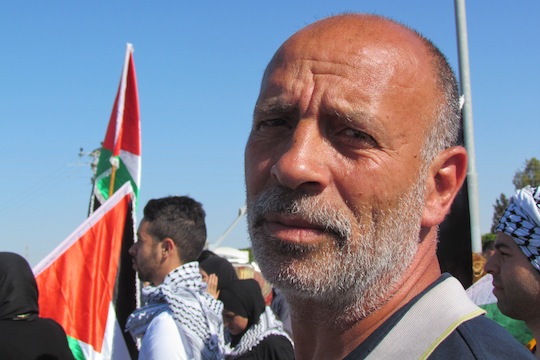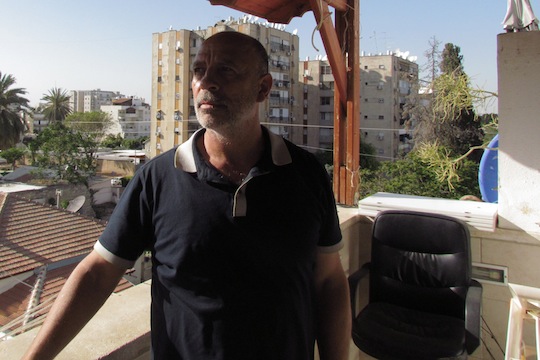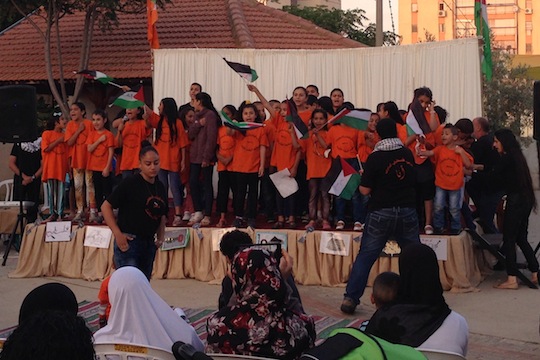In 1987, Mukhlas Burgal was sentenced to life in prison for throwing a bomb that failed to detonate at a bus full of Israeli soldiers. Since his release in the 2011 Gilad Shalit prisoner exchange, Mukhlas has opened a library, and heads several educational projects in his hometown of Lyd (“Lod” in Hebrew, “Lydda” in English). Three years after his release, he discusses his membership in the Popular Front for the Liberation of Palestine, the torturous interrogations of the Shin Bet, his time in prison and his new life.
“Have you heard of ‘Iskot’ cigarettes? Mukhlas Burgal asks me, not expecting an answer. “In prison, every prisoner gets a ration of four cigarettes per day. Not a lot, but everyone would get all the cigarettes at once, once a month, in packets. One time we got a new kind of cigarette, ‘Iskot,’ and everyone was dying to try them. The thing is that these were some of the worst smelling cigarettes ever produced.
“At that time I was put in a small cell with nine other inmates. Everyone but me smoked, and I was in one of the upper bunk beds. Until today I choke when I think about that one night when everyone lit their cigarettes. So, you know, one drag of your Marlboro doesn’t really affect me.”
Burgal’s response to accidentally blowing smoke in his face makes me laugh. Here’s a person who has spent so much time in prison that he has become immune to things that others would be annoyed by. How symbolic that “Iskot” in Arabic means “shut up.”
Mukhlas Burgal, 52, is one of the 1,027 prisoners released in the Gilad Shalit prisoner swap in late 2011. He was jailed twice; once for three-and-a-half years for membership in an illegal organization, and a second time for 24 years after attempting to blow up a bus full of Israeli soldiers, as a member of the Popular Front for the Liberation of Palestine (PFLP). Since his release, he has built an Arabic library in Lyd (the only one in the city), opened and managed a kindergarten, organized three camps for local youth through the Balad party, gotten married and become one of the most prominent political activists in Lyd.
I meet Burgal at the closing ceremony of his yearly camp, which takes place in the kindergarten he established. We’re in a large yard with no grating. The children stand on a stage, waving Palestinian flags and singing “Mawtani” – the Palestinian national anthem. Burgal stands with them in the back, looking discontent. He continues to organize the children, striving for perfection. The smiling faces of the parents with their cameras do not affect him. One child is out of place on the stage, and Burgal will do everything to bring him back to his proper position. I try to coordinate the interview with him, and he asks for a few minutes of privacy in order to go over his speech one last time. A perfectionist, or perhaps just serious.
Early life in Lyd
We finally meet the next day at the Balad headquarters in Lyd’s central bus station. Burgal has been a party member since 99, when he was still in prison, and today he is a field activist and regional director for Balad. He refuses to sit behind a desk and approaches to sit beside me. I’m curious to hear about his childhood, to understand his surroundings and find out what led a younger man from Lyd to join a militant Palestinian organization – a situation that seems, at least for now, vastly different from the reality of most young people in the city.
“We grew up in a city and an environment that was very unnatural,” he says. “People think that today the occupation and racism are an issue, but this is nothing compared to the years of my childhood. In 1948, my father sold his domesticated animal in order to buy a weapon and go to war. He was caught and arrested. My mother was considered a learned woman at the time, even if she was prevented from continuing to teach due to the acceptable societal norms back then. When you grow up in a conscious home, every instance of racism hurts and angers you even more.
“Every Saturday morning had its own ritual – the path to our school went through Jewish neighborhoods, which always led to trouble. Bleeding from stone throwing, ‘Dirty Arab,’ ‘Nasser is dead’ and ‘Mohammad is dead’ were commonplace. After school we would go home through the Jewish neighborhoods and return the stones.”
As Burgal speaks, I recall my own childhood traumas. My sister and I would also go to school on Saturdays, and we would return to the Jewish neighborhood in Lyd, where the children would make fun of us, point at us and joke at our expense. My experience pales next to Burgal’s – at least I wasn’t the target of rocks.
“Those were different days,” he adds. “The Arab youth of Ramle and Lyd established a kind of “local guard” whose sole purpose was to fight back against Jews who attacked Arabs. I’m talking to you about cases in which Jews would gather to beat a lone Arab in the street, or even cases in which bombs were thrown into the yards of Arab homes.
Do you remember a moment in which you really became active?
“There is no single moment – there is a chain of memories and difficult experiences that molded me during my teens. I especially remember how when I was 13 I cried for hours after we heard that my brother had been detained. They accused him of attempting to kidnap a soldier, and he was jailed for four years. When he was released he became a political activist and our home became a place where Abna’a el-Balad (Sons of the Land, a movement started in the 60s made up mostly of Palestinian citizens who boycott Knesset elections and which calls for full equality between Palestinians and Israelis) began meeting. I remember making jumps in my political and social consciousness in those years. By 1979 I was already a member of Abna’a Al-Balad, and I especially remember the turbulent protests during Land Day.”
When were you first imprisoned?
“In 1982. I began participating in military activities against the occupation in one of the smaller organizations that existed back then. I was caught and accused of belonging to an illegal organization and taking part in trainings. My brother’s prison stories were still very fresh in my mind, and I remember that even during the investigations I sat and planned what I would do after my release. Even then, at 20, surrounded by interrogators who threatened to destroy my life, the only thing I was interested in was the moment of my release and how I will continue fighting. I was released with an incredible amount of pent up energy.”
Twenty years old. Didn’t missing your parents play a part?
“Of course it did. I decided to spend all my time with my parents; when I was released I began to work with my father in his grocery store and I even began sleeping there in order to prevent robberies. At that time, I joined the PFLP. Nights in the grocery were perfect for planning.”
I lower my voice and ask whether he is referring to secret planning, and Burgal explodes with laughter. “Today nothing is secret anymore, they already sentenced me,” he responds, amused by the confidential nature of my question. “My job was to organize and hide weapons. I would obtain weapons from shady people, who, to my chagrin are still prevalent in Lyd. I would hide the weapons in ‘dead locations’ for when necessary. Even communication between myself and other operatives happened by leaving notes in these “dead locations,” so that it would be impossible to bring down the organization.”
Which didn’t really work.
“There is a saying in Arabic: ‘If more than two people know a secret, it’s no longer a secret.’ Our work method actually did work. The only time a third side was involved, we were caught.”
A month and a half of torture
Burgal is referring to his arrest in 1987, when he and his partner Mohammad Ziada were caught and accused of planning and executing hostile actions against state security.
One of our missions was to reconnoiter a bus full of soldiers traveling from Tel Aviv to a base in Sarafand (the Palestinian name for the area known as Tzrifin, R.Y.). I learned everything: the route and travel times of the bus, the changing number of soldiers according to hour. I learned that at a certain hour the bus is entirely filled with approximately 70 soldiers, and that’s the perfect time to attack it, on the 20th anniversary of the Naksa (1967 War, R.Y.). Abu-Mansour (Ziada) was the driver, and everything almost went according to plan, except for the fact that the bomb we threw at the bus was “cold” – its explosive mechanism was no good and the bomb didn’t go off. We fled the scene. We were stopped three months later. It turns out that the third party who supplied the weapon was a collaborator, and he led to our arrest.”
“At that stage we already knew we were being chased and we tried to escape. Both of us were captured in Jerusalem’s Old City. We hid in two different places. I was in hiding when I heard them say “we caught the first one” on the two-way radio of a policeman who passed by without noticing me. The hiding place in Jerusalem was meant to be temporary before I fled the country, but instead became the scene of the chase. In the end, they managed to catch me and badly injured me in the process.”
From here, our conversation becomes more difficult. For me. Burgal describes how it all went down, and talks about the torture during the interrogation and continues to describe the harsh reality of prison. While he speaks he notices that I’m not writing. He comments on it. His calm tone and restraint while speaking about torture bothered me. A person has to go through so much just to remember a traumatic chapter in his or her life, not to mention describe it calmly, I tell myself.
“The torture began in Sha’arei Tzedek Hospital. I was badly wounded in my head during my arrest and needed 14 stitches. The interrogators would step on my head and open my stitches. Between blows they would yell and curse at me, trying to explain that it’s over and I’m going to die.
“The first days after detention are critical. The detainee is in a very vulnerable emotional state and feels devastated. The Shin Bet (Israel Security Agency) knows this and that’s why they use most of their violence in the beginning. The transition from freedom to detention can be the end of the person. Imagine the mental anguish created by torture.”
What do you remember from the interrogation?
“Almost everything. I remember how they tied me to the chair, my arms and legs tied to the back of the chair, a black sack over my head. They would hit in the head and then immediately dunk me in water so that I wouldn’t have any time to recover. The genitals also get their share of violence. They try to hurt you in every sensitive part of your body. After three days in this hell, I understood that I need to be prepared to die in order to survive. I didn’t want to die, but coming to terms with the fact that death may be inevitable kept me going.”
When did you break?
“I didn’t exactly break. The threshold of pain was indescribable – I truly thought that they were going to kill me. Between 10-12 Palestinian detainees were killed during those years (1987 to 1990). I chose life and admitted to the accusations leveled against me, for which they had strong evidence. The problem was that my admission only whet their appetites, and the interrogations lasted for another 57 unbearable days.
‘Every soldier kidnapping led to a deal’
At that moment Burgal receives a call and cuts off the story. He answers and speaks to a woman who called to ask about an English learning course that he organizes in his kindergarten. “Sorry, it’s a busy period. We’re starting new courses soon,” he says.
Burgal was sentenced to life in prison. He describes how his interrogators would change his shirts on the way to his remand hearings, so that the judge wouldn’t notice the blood stains, and without letting him see his lawyer.
You spent 24 years in prison before your release in the Shalit-prisoner deal. Did you believe you would eventually be released?
“Yes, don’t forget that the case of Ron Arad (an IAF pilot who was shot down over Lebanon in 1986, captured by Lebanese militias and is widely presumed dead) was very relevant during those days. Nearly every soldier kidnapping eventually led to a prisoner exchange. What was hardest in prison was the never-ending struggle with the Israel Prison Service. We needed to fight over every small thing. We needed to go on hunger strike in order to let our families send us underwear, for instance. I don’t remember how many times I went on hunger strike. Coincidentally, my last day in prison was also the last day of a hunger strike that some of us took part in.”
I once heard you explain that you oppose being characterized as a “security prisoner.” Why?
“I was never a security prisoner. In prison we strove for international recognition as prisoners of war. Even in prison it is important to protect your right to self-determination. The term ‘security prisoner’ is an Israeli one. The correct term is ‘political prisoners,’ even if a large part of the prisoners were arrested due to military activities. This is the only term that does not deny the situation that I represent in the eyes of the Palestinian people.’
October 18, 2011 was the day of the prisoner release in the Shalit deal. Burgal did not believe that it would be a soldier kidnapped from a tank who would bring about his release, especially under a right-wing government.
When did you truly understand that it was over – that you were going to be released?
“I had faith, but I can say wholeheartedly that it hit me the second that I exited the police chief’s vehicle and stood outside the entrance of my home. I didn’t expect such a large welcoming. It took me five minutes to make my way through the crowd to hug my mother. Until today I walk around the streets and people whom I don’t even know come up to me.”
You leave prison and immediately become involved in the Arab community in your city. Out of all the things you could have done, why did you open a kindergarten?
He smiles. “After I was released, I immediately went to see what our community’s needs were that are not being met by the discriminatory establishment. There aren’t enough kindergartens in the city, and kindergartens are an excellent platform for education and instilling values, through prolonged interaction with the parents, who are, for all intents and purposes, my community.”
I am reminded of something Burgal said in the beginning of our interview, that already during his first detention he realized that he would continue struggling for his people.
“In prison I knew that if and when I was released, I would return to be a political activist. In this past year’s camp session we separated the children into different groups, each one representing a different Palestinian refugee camp. This is the way we teach our children about the historic connection to Palestine, a connection that the establishment is trying to erase.”
Let me bring you back to 1987. Looking back, would you have done things differently?
Back then, whatever you did looked like a natural choice. Ehud Barak himself said that if he were a Palestinian he would have acted in the same way. At 20 or 25 it doesn’t seem like something wrong to do. The occupation turned us into a kind of mutation – shapeless, lacking identity or belonging. Of course in the moment the bomb was thrown it was obvious to me that the goal was to support my people in their struggle rather than killing those very soldiers. I didn’t think about it at all.
Mukhlas Burgal silently gazes outside through the window for a few moments before adding: “Today, with the tools, knowledge, consciousness and understanding that I have, I will continue to support my people, in other ways.”
Read this article in Hebrew on Local Call.




